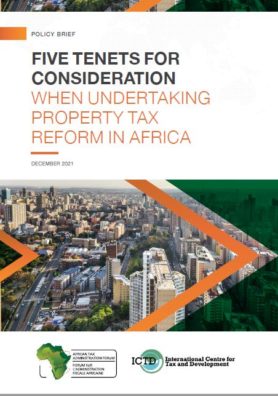The current COVID-19 pandemic and associated economic crisis have seen Africa fall into recession for the first time in over 25 years. This has strained already limited local government resources significantly. At the same time, the pandemic has highlighted the central role local governments play as frontline service providers and thus reignited the urgency of raising more revenues to adequately provide these services.
There is a growing consensus around Africa that property tax offers a large and, to date, untapped potential source of revenue; across Africa, property tax revenues still amount to considerably less than 0.5% of GDP. Dedicated property tax reform programmes can help increase property tax’s contribution to domestic revenues. The exact nature of reform, and the determinants of its success, will vary depending on the political, administrative, and institutional context in which the reform is being carried out.
Drawing on existing research, country experiences and recommendations from the 6th ATAF’s African Tax Research Network (ATRN) Congress (6th – 8th September 2021) bringing together researchers and practitioners from over 40 African countries and three webinars (March to June 2021) jointly organised by the African Tax Administration Forum (ATAF), and the African Property Tax Initiative (APTI), this policy brief highlighted five common tenets to successful property tax reform. These tenets have been distilled from the spectrum of African experiences and may be considered by other policy makers embarking on their own reforms.
See the brief on the ATAF website here.
